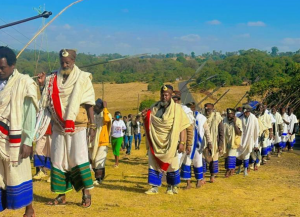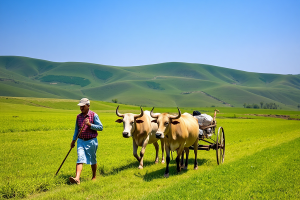
The Gada system is a very huge and complex social institution in which the traditional Oromo people manage their socio political and religious practices. It is a well-developed and age-based grouping up on which the religious, political, economic and social lives of the people were formed. It is an indigenous socio-political democratic system of the Oromo people that regulated Political stability, economic development, social activities, cultural obligations, moral responsibility, and the philosophy of religious order of the society. The political philosophy of Gadaa is based on three main values: terms of eight years, balanced opposition between parties, and power sharing between higher and lower levels.
Gadaa is an indigenous socio-political system that regulated Political stability, Economic development, Social activities, Cultural obligations, Moral responsibility, and the philosophy of religious order of the Oromo society. In Gujii Gadaa system there are Muudaana, Halchiisa, Dhallaana, Harmufa and Roobalee parties. These five party systems are the operational mechanism of the Gadaa cycle. Gumii Bokkoo is Gujii social assembly of the Gujii confederacy (Uraagaa, Maattii and Hookkuu) is held every eight years at a place Me’ee Bokkoo. It is composed of Haaganaa Saglan comprising Gadaa, Dooriiand Raaba from Uraagaa, Maattii and Hookkuu. During this Gumii assembly, different indigenous laws are proclaimed, amended and rehearsed. As Gujii Oromo elders narrate, Baallii transfer may not change unless the country faces natural or manmade problems such as dislocation of people, war, famine, drought etc. The term office of the elected Gadaa leaders was limited to eight years and ending with a formal power transfer ceremony called Baallii. Power was transferred from one party to other party peacefully through fair and free and periodic election. Baallii Ceremony was a transitional ceremony that involved large feasting and extensive ritual activities. It was a period when the strength of the incoming Gadaa members (Luba) was tested and it was a time when incoming Gadaa class took the socio-political and religious power from the outgoing Gadaa class. The transfer of power was carried out when the legal expert transferred the Baallii Guchii (ostrich feather) from the outgoing Abbaa Gadaa to the incoming one. The two parties exchanged milk and blessings. Then the one who takes power accepted the ‘Eebbaa’ (blessing) through handing over seven ‘Daraara. It confirms the existence of peace, and respect between giving and taking power of Gadaa and ambition of the same by taking Abbaa Gadaa in his Gadaa reign. The 75th Gujii Gadaa Power transferred from leaders of ‘Harmuufa Baallii’ Jilo Mandho who ruled for last eight years from (2016 to 2024) to the candidates of ‘Roobalee Baallii,’ Jaarsoo Dhugoo who is going to rule for coming eight years from (2024 to 2032).
At the inauguration of 75th Gadaa power transfer ceremony of the Gujii Oromo, marking the handover of power from the Harmuufaa to Roobalee Gadaa classes have commenced in Me’ee Bokkoo, a ritual site found in Annaa Sorraa district of Gujii zone, Southern Oromia, Oromia president Shimelis Abdisa said that the Oromo Gadaa system is being properly recognized and strengthened by incorporating education into the education system. He also congratulated the elders who handed over their Balli and congratulates the Roobalee elders who took power. The state government is working to introduce the Oromo Gada into the education system to solve socio-economic problems, he said
The ceremony kicked off following Abbaa Gadaas from the three confederacies of the Gujii namely Uraagaa, Maattii and Hookkuu alongside their counsellors and members of their delegation arrived at Me’ee Bokkoo and settled in their temporary house called “Qachaa”
The Oromo have lived in this system for centuries, conducting their daily lives and carrying out their political and socio-economic affairs. This system has been targeted for destruction by numerous Ethiopian regimes, but although being weakened in different times it has remained intact thanks to its solid basis and foundation
The Gada system has its own structure and leadership members who implement the system. The so-called full Gada may include the Gada, Hayyuu, Yuuba, Waabura, Faga, Jaldhaaba and Torbii as its members. To become an Abba Gada, one must go through the stages of Gada from Qarreer, Dabballee, Kuusa, Raaba and Doorii.

This system has been passed down from generation to generation without being lost, especially in Borana and Guji over the centuries.
According to Abba Gada Jilo, there is no cruelty and injury in this system, it is very democratic. The Gada system, which is known for giving high importance to women and children, especially allows children to practice the way of life through the stages of the system, he said.
He stated that since there were numerous requirements for being a candidate, a candidate’s speech pattern had to be sound, compelling, and well-liked by the public. Furthermore, having a family is essential since it is believed that a person with a family and the ability to rule will also rule the nation. They considered his status, his ability to communicate, his politeness, the fact that he had never murdered someone or an animal, his ability to speak, and his acceptance by the public prompted them to appoint him as a judge in less than a week. He visits the rabbi and remains in the quiteplace after they appoint him as a judge. Next, he arrives at the dori, where he performs the circumcision and cuts the waddessa.
The expert claims that in Guji, a person nominated for Gada goes to the Gannalee or Golocha Fooqaa side for training, enduring all the difficulties of detail before emerging and taking the baallii as Gada. The Yuba spend this time training and teaching for a month. This month, he went without food or water for a week. There are also significant battles and illuminations in the training. This is due to the notion that a ruler ought to learn from mistakes in addition to enforcing the law.
Through this process, he learns how the Baallii manages the people and the planet; the training will enable him to bear hunger and thirst rather than fleeing in despair.
The Abba Gada who gave the baallii is not allowed to retire, per the Gada System, as there are many levels of advancement within the Gada. After providing the Gada, one is promoted to Yuuba by serving in the order of Baatuu, Hayyuu guddaa, and Hayyuu Xiqqaa. In doing so, he brings his life to a close by working as a counsellor, guide, mediator, problem solver, etc. till he attains the status of guduru.
The Abbaa Gada has been famous in the ceremony for asking about the welfare of the people since he took the baallii, he said, adding that it is a provision of the Gada system to leave his home to serve his people. He explained that “it is impossible to travel from Bulee Hora Barguda to Me’ee Bokko where he gives the baallii.”
When they reach the jila area, they get their body warm by fire and eat the offerings at sunset, tell the children about the Gada system and raise them with it.
“The migration of the Jila Arda is the place where the Jila Daraartuu Arda is located in Doola Reedde District, Guji Region. The procession is performed when the Abba Gada finishes his baallii and is about to give the baallii.
According to the expert, the conference will analyse the work done by the Abba Gadaa during the baallii ceremony; his work to solve the socio-economic problems of the people will also be examined. In Gada, if the Abba Gada commits a crime, the Hayyuu punishes him. Thus, a meeting would bde held at Odaa Adoola in the presence of the elders of Harmuufaa Gada, the elder and younger clans of Uraagaa, Maatti and Hookkuu as well as Gada intellectuals.
Overall, it is a great achievement that this exemplary democratic system has been preserved and protected and it is a great achievement that it has been registered as a UNESCO World Heritage .
Although it is good that this system is being given as a form of education to keep it beautiful and pass it on from generation to generation, our message is that everyone should take his/her responsibility so that the spread of technology and modern education does not affect the system.
BY NAOL GIRMA
THE ETHIOPIAN HERALD SATURDAY 24 FEBRUARY 2024


